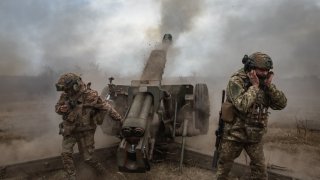World Order is in a Downward Spiral
The United States needs a grand strategy to deal with three interconnected threats to global stability.
The international system is well into its most challenging period since the years that led up to the Cuban Missile Crisis, as the liberal world order gradually erodes. U.S.-China relations are on a path to an eventual confrontation while the balance of power in Asia shifts against the United States. A Russian dictator seeks to overthrow the European security system that brought peace and prosperity to the continent for many decades. The war in Gaza demonstrates the failure of successive American administrations to contend with the hegemonic ambitions of Iran effectively. Diplomacy has yet to mitigate the abiding danger in any of these cases.
Both Washington and Beijing seem intent on a quiet, uneventful 2024—President Joe Biden desires re-election, and Xi Jinping wants to concentrate on his formidable domestic economic challenges. However, 2025 and beyond is an entirely different matter. Neither side seems prepared to bend on the issue, which is most likely to trigger a war between the two states—Taiwan. China continues the overhaul of its military forces in preparation to subjugate Taiwan through blockade, missile attack, or invasion. Washington appears increasingly willing to go to war with China over Taiwan, and the Biden administration, spurred on by both parties in Congress, works intensively to bolster every element of U.S.-Taiwan bilateral relations—military, economic, diplomatic—despite Beijing’s fervent protests.
So the “One China” policy that has kept the peace across the Taiwan Straits for half a century, based on mutual restraint, is increasingly at odds with the substantive actions taken by the two governments. Beijing must realize that the pre-existing understanding that both sides of the Straits agree there is only “One China” is no longer true in Taiwan and that long-term political trends in Taiwan are profoundly bleak from a Chinese perspective. The United States and China are headed for catastrophe over Taiwan, and neither apparently has the political will and the diplomatic ingenuity to compromise or address this potential nuclear showdown seriously.
Across the Atlantic, with his army gaining ground, Vladimir Putin is not likely to give up territory that Russia presently occupies in eastern Ukraine, and certainly not Crimea. Any Ukrainian military success in Crimea would serve to increase Putin’s willingness to use tactical nuclear weapons and ensure his most prized imperial legacy to the Russian people—the return of Crimea to the Motherland—will endure. As in the case of Taiwan, there is no realistic diplomatic option on the table that would end Putin’s brutal invasion of Ukraine and bring Russia into a European security system. Thus, for the foreseeable future, Moscow will continue to work with China and others to undermine the fundamentals of world order, with the ever-present danger that the current conflict in Ukraine, terrible as it is, could escalate into something far worse.
Regarding the Middle East, many continue to call for a “Two State” solution to the Palestinian problem when prospects for that outcome have never been worse. Israel, unsurprisingly, has little incentive to negotiate with those who are determined to destroy it—and Hamas makes no secret of its intent to eradicate the Jewish State. Therefore, the Palestinian issue will continue to roil the Middle East while Iran destabilizes the region and comes ever closer to obtaining a nuclear weapon. In such a future, there will be no Israel-Saudi diplomatic normalization, and the tragic plight of the people in Gaza will go largely unattended. Moreover, Jerusalem could soon comprehensively confront the growing Hezbollah threat, again raising the prospect of a wider war with Iran that could draw in the United States.
All of this occurs as the United States tears at the fabric of its domestic peace and stability. Is it any wonder that adversaries contend and allies worry that America is in permanent decline? Where is a sensible U.S. grand strategy, from either side of the aisle, utilizing prescriptive diplomacy to counter these three associated threats to the future of the American people and the liberal international order?
Given the enormous stakes, journalists and the media should push presidential contenders to address how they would cope with this menacing combination. The candidates may dodge reality with bombastic one-liners or staff-generated speeches during the campaign, but the winner will not escape from these three connected tribulations.
Robert D. Blackwill is Henry A. Kissinger Senior Fellow at the Council on Foreign Relations. His latest book is Lost Decade: The U.S. Pivot to Asia and the Rise of Chinese Power, co-written with Richard Fontaine and published by Oxford University Press on June 11, 2024.
Image: Drop of Light / Shutterstock.com.

